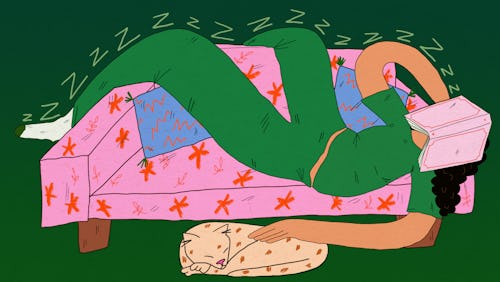Your most deranged dreams could be making you more creative, according to science
Even when we think we’re totally unconscious, our brains are hard at work.

Whenever I dream about being stuck in a corn maze with Kamala Harris (yes, this is a recurring one), I always try to find deeper meaning. Maybe I’m meant to run for office, or maybe my body is trying to tell me I’m allergic to corn. But even if our strange dreams don’t signify anything, new research suggests that they could still be stimulating our creativity and sharpening our learning skills.
In a peer reviewed study published on the Human Brain Project, researchers used a simulation of the brain to figure out how different phases of sleep affect learning, per EurekAlert. The brain simulation was put through the three different states: wakefulness, non-REM sleep, and REM sleep. For those who don’t know, REM (which stands for rapid eye movement) sleep is a deep stage of sleep that leaves you feeling rested and that studies have found reduces depression and anxiety.
During each state of consciousness, the research notes, the brain model researchers used was presented with images of everyday objects. They found that the brain model was still able to reconstruct images very vividly during the REM phase of sleep, but combined and distorted them in ways that didn't always make sense. This would explain why some of our weirdest dreams also feel the most realistic and why they often take two totally unrelated things — in my case, the Vice President of the United States and corn mazes — to combine them in incredibly imaginative ways.
So why does this matter? For one, it’s going to stop people like me from spending hours overanalyzing dreams that don’t make sense and just accept that our brains are just weird. But beyond that, it suggests that each state of wakefulness and sleep serves a unique role in the process of learning.
When we are awake, we are taking in a stimulus; during non-REM sleep, we are solidifying an experience; during REM sleep, it’s believed that we ascribe new (and sometimes unusual) meanings to them that help us think about things in different ways, per EurekAlert. It’s important to keep in mind that Oneirology, or dream science, is relatively new and this study is not making any solid conclusions. Still, it’s cool to think about how our minds are always building and imagining new possibilities, even in a state of unconsciousness.
“It shouldn't be surprising that dreams are bizarre: this bizarreness serves a purpose. The next time you’re having crazy dreams, maybe don't try to find a deeper meaning - your brain may be simply organizing your experiences,” said Nicolas Deperrois, lead author of the study.